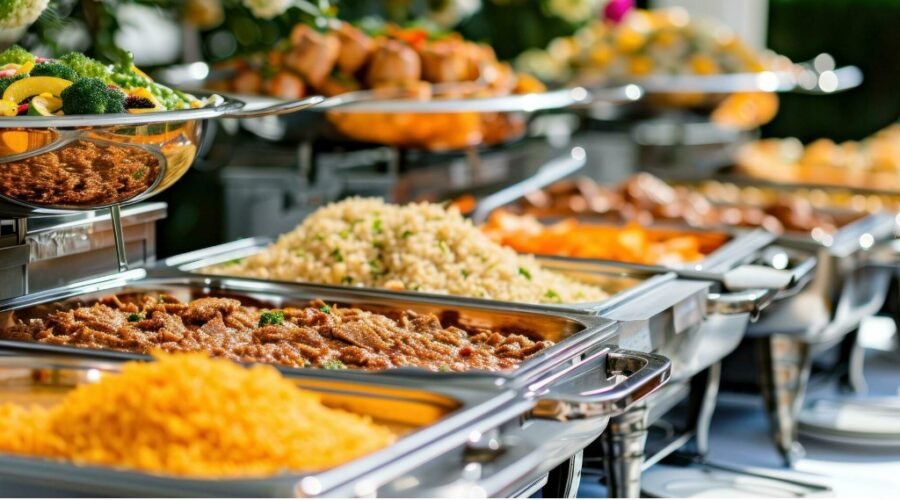Guide to Halal Catering
CATERER’S GUIDE
The following guide to help Food and Function caterers and coordinators understand the special dietary requirements of their Muslim customers
“Oh you who believe eat of lawful things that we have provided you with, and be grateful to Allah if it is indeed he whom you worship”
Al-Baqarah 2:172
What does Halal mean?
❖ Halal is an Arabic word, meaning lawful, and is the Islamic dietary law that identifies food permitted for Muslims.
❖ Non-halal is also referred to in Arabic as Haram (meaning not permissible) ❖ Alcohol and pork products are NOT permitted (not HALAL) including pork lard, ham and bacon)
❖ For processed foods to be Halal, they must be free of alcohol and pork, and must not have come into contact with either of them during the manufacturing process.
Where can I get Halal meat?
Ÿ Butchers: There are several authorized butchers in New Zealand that supply Halal meat. Visit the Kiwi Muslim Directory website (stage.muslimdirectory.co.nz) for a list of Halal outlets.
Ÿ Pre-packaged meat: Chicken from certain suppliers are certified Halal.
What precautions must I take during the food preparation?
Ÿ All utensils, crockery, glass, serving dishes and food preparation surfaces must be thoroughly cleaned before use.
Ÿ Halal meat should be purchased from an authorized Halal butcher.
Ÿ Ensure that the ordering of Halal and non-Halal meat is done separately. Ÿ A separate surface work area, chopping board and knife should be used for HALAL MEAT AND PRODUCTS ONLY and should be thoroughly cleaned before use. Ÿ Make sure you can tell between the Halal meat and the non-Halal by labeling them or by putting on different toppings etc.…
Ÿ Never cook Halal and non-Halal meat in the same container.
Ÿ If possible, cook Halal meat in a separate oven to non-Halal.
Ÿ If separate ovens aren’t available, Halal meat should be cooked in a separate container to non-Halal to avoid contamination.
Ÿ Once it’s been cooked, keep the Halal meat and Halal dishes away from non-Halal meat and dishes and make sure that they are easily identified.
Ÿ Halal dishes SHOULD BE CLEARLY IDENTIFIED so not to cause confusion with the non-Halal dishes.
CATERER’S GUIDE
Ÿ Separate serving utensils should be used and retained for Halal meat and Halal prod ucts only.
Ÿ Use vegetable oil when frying any food such as chips, spring rolls, etc. Ÿ Don’t cook or serve any food that has had alcohol (such as beer or wine) added to it (however little the quantity).
Ÿ Ensure salads do not contain any non-Halal meat or pork and the cheese used is Halal. Ÿ Take extra care to ensure that all the Halal food does not make even accidental contact with non-Halal food through mixing utensils, spillages and drops. Once such contact has been made the food cannot thereafter be consumed by Muslims under any circum tances.
Are there any special requirements when it comes to non-meat products?
Ÿ Fruit, vegetables, dairy products, grains/cereals, herbs and spices are Halal. Ÿ If making sandwiches, avoid any butter substitutes made with animal fat. The label will indicate use of such fat.
Ÿ It is safe to use e-numbers listed on the Vegetarian Societies website www.vegsoc.org/page.aspx?pid=727
Ÿ Any biscuits provided should contain no animal fats other than butter. Also check the label to ensure that cochineal has not been used in their production as this is not vegetarian
Ÿ Food items should not contain gelatin (unless it is of a vegetarian variety). Ÿ Alcohol should not be used in the preparation of any food.
Ÿ No animal fat should be used in any cooking, and when cheese is used it should be of the kind labeled ‘vegetarian’ which indicates that it has not been made with rennet which comes from animal source.
Ÿ Potato chips that have beef fat/tallow are NOT permitted
How do I serve non-halal and Halal food at the same venue?
- Where no special arrangements have been made to cater for halal meat, Muslims are generally happy to eat vegetarian food that has no animal fat or by-products used in its production.
- Most fish dishes are also permissible, provided there is no contamination with other non-Halal products or cooked in BEER batter.
- If non-halal meat and fish dishes or sandwiches are provided as part of a meal, ensure that they are on separate platters and label them to avoid confusion. •Where alcoholic drinks are being served ensure that they kept separate from the non- alcoholic ones.
- If using an external caterer for an event, underline that any meat and fish items must be on completely separate platters.
Source: Crescents of Brisbane Inc., www.crescentsofbrisbane.org
with a minor variation for New Zealand.
Approved by: Sheikh Imtiyaz Boda: Islamic Advisor, Kiwi Muslim Directory




